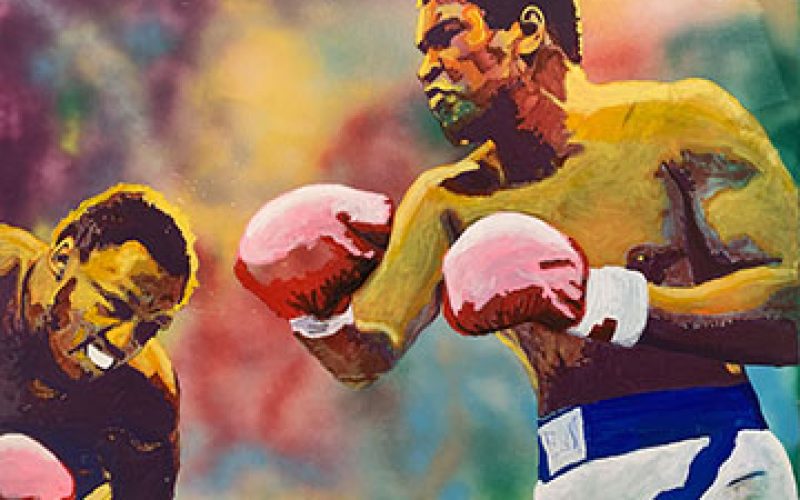‘Black Experience’ is topic at Rogers Historical Museum
BECCA MARTIN-BROWN
bmartin@nwadg.com
When the Rogers Historical Museum reopened to the public Sept. 24, its exhibits showcased not just the past but history being made in the present. “Reflections of The Black Experience,” an art collection curated by Kinya Christian and on show in the Trammel Gallery, is “reflective of the African diaspora to the modern-day Black experience in America.”

“The Trammel Gallery provides us with a flexible space within the museum galleries that can be used for temporary exhibits, such as the ‘Reflections of the Black Experience,’ and special events,” says Rogers Historical Museum Director Serena Barnett. “We cannot change our history, but we can certainly learn from it. Educating ourselves on where we’ve come from is the first step in making positive changes in ourselves and in our society.”
(Courtesy Photo)
Conceived and installed before covid-19 closed the museum, the exhibition features works by local and regional artists including Brian Elenbarger, Marzelle Williams, Gregory Janicke, Nick Palmer, Leona Hunter-Wade, DeShon McBride, Karen Wagaman, Shelley Mouber and Jim Johnson and offers “visual excerpts of the groundbreaking 1619 Project led by Nikole Hannah-Jones with The New York Times, as well as other historical images highlighting the Black American experience,” Christian says.
Christian says she had her own eyes opened to history she’d never really been taught when she discovered The 1619 Project last year.
“The version of American history I was taught in public school did not include most of the historical facts reported on in The 1619 Project. And what is more, this project brings the facts forward and exposes their effect on systems we exist under today,” she says. “People need to realize that racism is defined as a power structure of socio-economic actions, practices and beliefs that allows one group to put a system in place where they use their race to direct discrimination against people of a different race. Racism is nothing new in America, but too much of the conversation mistakes being prejudiced for being racist. Racism and racist systems exist when one group has power and influence over another.”
The 1619 Project is described as “an ongoing initiative from The New York Times Magazine that began in August 2019, the 400th anniversary of the beginning of American slavery. It aims to reframe the country’s history by placing the consequences of slavery and the contributions of Black Americans at the very center of our national narrative.”
“I decided, as an artist and a Black woman, I could identify with many of [reporter] Nikole Hannah-Jones’ thoughts,” Christian says. “So I decided to curate an exhibit to feature Arkansas artists, to show through art the Black experience and to highlight The 1619 Project and its timeline.”
The exhibit opened at the Rogers Experimental House during February to mark Black History Month, then moved to the Trammel Gallery at the Rogers Historical Museum on Feb. 29.
“It was to move from there to a location, at the time, to be determined,” Christian says. “And then covid-19 happened. The museum director, Serena Barnett, reached out to offer to keep the exhibit through February 2021. With this generous offer, I am working to add more artwork to it as it will continue to travel — so if there are any artists interested in participating in this exhibit, please reach out!”
“The Trammel Gallery provides us with a flexible space within the museum galleries that can be used for temporary exhibits, such as the ‘Reflections of the Black Experience,’ and special events,” Barnett says. “We cannot change our history, but we can certainly learn from it. Educating ourselves on where we’ve come from is the first step in making positive changes in ourselves and in our society.
“RHM is dedicated to preserving and sharing the history of the diversity of people in our community,” Barnett goes on. “In response to current events, RHM will work harder to ensure that we tell the inclusive history of all people who live and have lived in our area and create a space for open dialogue to discuss our local and national history together. By extending the dates of ‘Reflections of the Black Experience’ through February 2021, we hope to give the opportunity to anyone who would like to visit or revisit the exhibit in person.”
“My goal for this exhibit is for people to be enlightened through education and inspired by the artwork,” Christian concludes. “I believe that a person has within his or her power to change if the desire is there. Knowledge has the power to eliminate fear. Art is a therapy that could aid in healing the trauma of racism and hateful thinking.”

Among works on show in “Reflections of The Black Experience,” which reopened Sept. 24 at the Rogers Historical Museum, is “Woman I” by Kinya Christian.
(Courtesy Image)
FAQ
‘Reflections of The Black Experience’
WHEN — 10-11 a.m. & 1-2 p.m. Thursday & Friday; 11 a.m.-2 p.m. Saturday, through February 2021
WHERE — Rogers Historical Museum
COST — Free
INFO — 621-1154 or rogershistoricalmuseum.org






